When celebrities of any sort pass away, we have a tendency to react in two divergent ways. One: we maybe connect ourselves to these complete strangers we never knew on a personal basis, over-identifying with their death and perhaps perpetuating the ongoing cult of fame that pundits like to pretend is destroying the firmament of reality. Two: we openly criticize anyone who shows any emotion about such deaths, pretending that it’s impossible in to be in any way affected by the untimely passing of a movie star and to care about Important Current Events at the same time. It’s all bullshit. Beyond being celebrities, many artists touch our lives on a deeper level even than members of our own families. In the case of Robin Williams, naming another individual who brought so many smiles to so many people becomes a difficult task. He was a supremely gifted performer and dedicated his life to a medium that, above all else, enriches our lives by offering comfort, solace, escape, and nourishment.
Here at Deadshirt we decided to cope with this tragedy the way we cope with most things: by analyzing what we love, the things that affect us, and hopefully finding some meaning and value within that love.
Robin Williams will be missed. One can only hope in life he fathomed even a fraction of the joy he brought to millions.
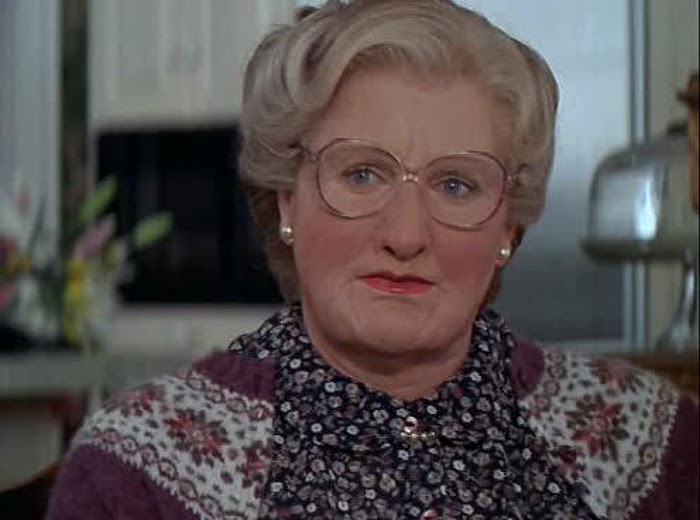
[Source]
Mrs. Doubtfire
Reading Gene Seymour’s excellent obituary for Robin Williams, I was struck by the fact that the author scoffed at his 1993 film, Mrs. Doubtfire, in favor of some of the actor’s more high-minded fare. This is an understandable reaction; to someone who was an adult at that time, the Chris Columbus film was probably just a cute-at-best, tolerable-at-worst family flick that came and went. But Mrs. Doubtfire was the movie that told me–TOLD me–that my parents’ then recent divorce was normal and I know I’m not alone in that.
I haven’t watched Mrs. Doubtfire in many years but it’s a testament to how genuinely funny that movie is that I can remember so many of the gags with almost perfect clarity: Williams’ pitch-perfect chemistry with Harvey Fierstein during one of the best “character tries on montage of zany outfits” scenes in American cinema, or his increasingly deteriorating makeup and outfit during a visit from a stern social worker. The film is, wisely, a vehicle for Williams’ Looney Tunes comic madness but tempers it with a very genuine underlying plot of a father desperate to be with and connect with his children.
From a few accounts I’ve read over the years, studio heads nearly didn’t go through with Mrs. Doubtfire‘s ending as written, where Williams’ Daniel and his ex-wife Miranda (Sally Field, whose ability to play anger and hurt on screen is the highlight of so many films, but especially this one) reconcile platonically. But the importance of that ending to me, and to others who were growing up at that time as children of divorce, is unquestionable: while a movie like Jim Carrey’s Liar, Liar might end on a copout “magic kiss” between a split-up mom and dad, Mrs. Doubtfire ends with Williams gently reassuring a little girl that, no matter what happens between her parents, she is loved and that she will be “all right.” I didn’t know Robin Williams, but I will always love him for that. – Max Robinson
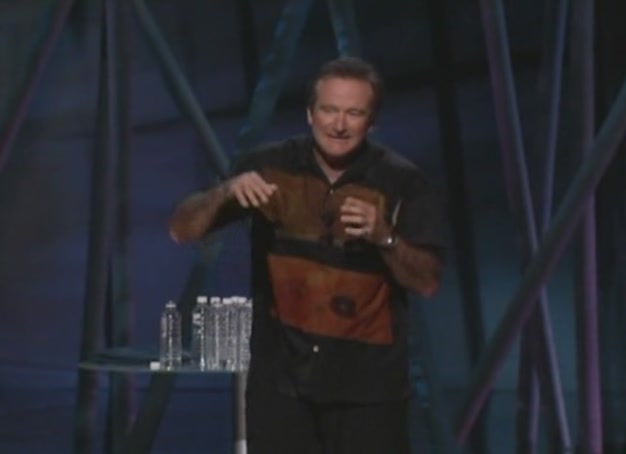
[Source]
Robin Williams: Live On Broadway
The first two full length stand up specials I experienced growing up were Jerry Seinfeld’s I’m Telling You For The Last Time and Robin Williams’s Live on Broadway. It’s hard to think of too many comics with such radically different styles–Seinfeld’s calculated storytelling against Robin’s rapidfire, seemingly improvised routine–and both made strong impressions on me. I was a bit young to comprehend much of Robin’s subject matter, but I loved what I got (or pretended to get) and his energy was infectious. I was struck in particular by his use of a lapel mic, a sharp contrast to the handheld mic often associated with stand-up acts–a tool that helped put his high energy delivery front and center.
Years later I’ve looked back at Live On Broadway a few times and I’ve realized how it’s a work of comic genius. I don’t use that phrase lightly. The routine covers the entire comedic spectrum, from classic observational comedy to crossing lines that few would dare to even approach, yet it blends together perfectly. His delivery is what seals the deal. At times he sneaks jokes the audience probably knows into his routine, but he tells them in such a way that it seems like he’s the one who wrote it in the first place. I’m fully convinced that Robin could tell “Why did the chicken cross the road?” without changing the punchline and make it seem like the funniest thing in the world.
His bit on the invention of golf is the stuff of legends and his bit about Jihads is a fascinating time capsule of early post-9/11 comedy. Perhaps the best example of his skill is his routine on biblical miracles: routines on religion are among the most exhausted themes in comedy, but his bit comes across as completely original. Not only does he address fundamentalist beliefs, he managed to throw in jabs at Southerners, the French, Charlton Heston, the Second Amendment, The Honeymooners, Jewish mothers, Groundhog Day, and the Easter bunny–all in under eight minutes, without deviating too much from the core of his routine.
The whole show is a testament to his ability to make us laugh at anything, no matter how old-fashioned or taboo. There’s never been anyone quite like him. There may never be again. But we’ll always have the hours upon hours of material he made during his life to make our days just a little better. – David Lebovitz
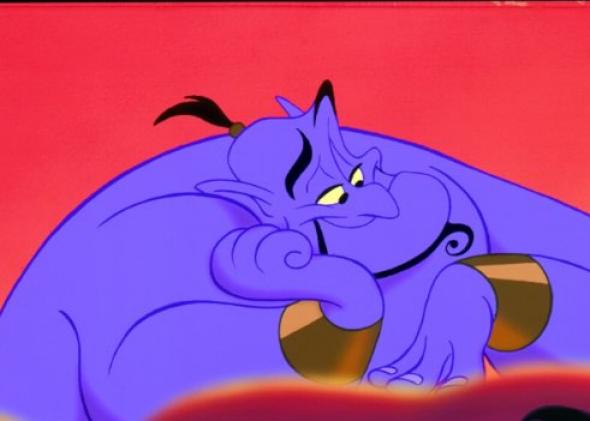
[Source]
Aladdin
One of the earliest childhood obsessions I can recall is Disney’s Aladdin; specifically, Robin Williams’ portrayal of Genie. I remember sitting with the soundtrack cassette on the floor of my room and listening to “Prince Ali” and “Friend Like Me” over and over, studying the insert until I had committed the lyrics to memory. Five-year-old Sam even performed “Friend Like Me” at a talent show, complete with an ill-advised dance number of my own design. Williams, who in those days was basically a living cartoon character himself, embodied the Genie with a vibrant fullness that has been matched by very few voice actors since.
I’ll be the first to admit that I was an annoyingly precocious child. Of course it’s no surprise that I found something to identify with in the character. Williams’ fast-talking, anachronism-laden antics were a gold mine for a kid slowly discovering a love for pop culture and lacking the language to properly express it. Robin Williams was the first celebrity name I knew, and over the years I have devoured his oeuvre, loving some (Mrs. Doubtfire, The Birdcage) more than others (Hook – I know, I’m a monster). Still, Aladdin has remained, to me, the pinnacle of his work.
News of his death stopped me in my tracks; I don’t think I’ve ever felt more personally affected by a celebrity’s passing. Late one night last week, unable to sleep, I re-watched Aladdin for the first time in many, many years. Knowing now about Williams’ battle with depression adds an unintended but perfectly appropriate layer to Genie – both are larger-than-life characters who cover their private sadness by acting out to make others laugh. Williams may be gone much too soon, but its a small comfort to the many people whose lives he touched that we still have pieces of him to laugh with, forever. – Sam Paxton
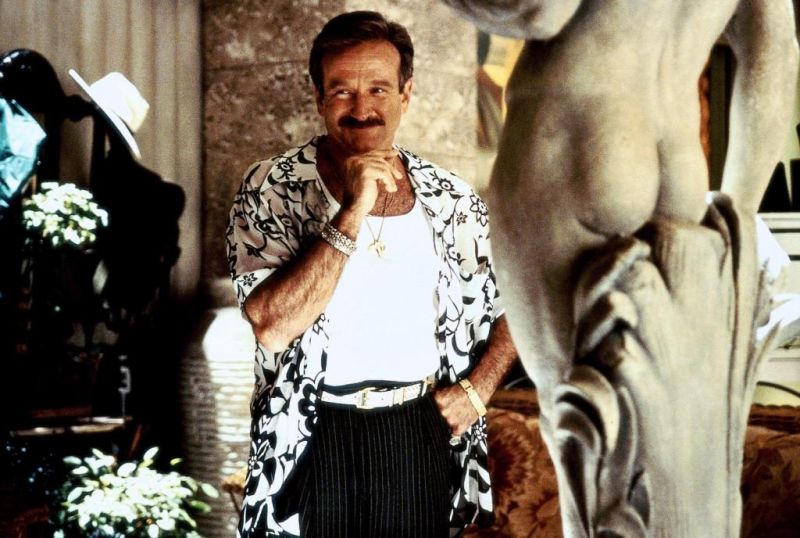
[Source]
The Birdcage
Many, perhaps most, comedians show proficiency in being the clown, the straight man, and in dramatic performance. It’s rare to remember one as a bonafide game-changing expert in all three.
The most recent Robin Williams movie I’ve seen–excepting Hook–is The Birdcage. Despite my passion for LGBT rights and childhood in 90s South Florida, it was a glaring lack in my cultural knowledge. And let’s be honest, from a plot/synopsis perspective, it doesn’t sound like a must-see. Thankfully my friends insisted on rectifying my cluelessness and I laughed myself stupid. Only now, training my analysis lasers on it, do I see what the movie has to say about Williams. When I first conceived of writing about The Birdcage, I thought “what can I really say about Williams from this movie? He stands back and lets the broader characters run off with it.” And then it hit me: of course he fucking does. Cause that’s who he was.
In return for being the film’s structural lead character, Williams reins in his typical bombast in favor of being a quietly effective foil for the other characters. It certainly isn’t the only time he’s done so. And make no mistake, in a movie where the joke rate breaks the sound barrier, his motor-mouth and physical dynamism are great assets. But he holds back and enhances the performances of the other characters, mirroring the role of his own character in the film.
Armand Goldman’s only goals are to keep the various people in his life happy, without a thought for what they’ve done for him. He willingly subsumes his true self for the sake of his son, his doubt proving secondary to his loving indulgence. He flatters and rains affection on his drag-queen husband, dismissing his tantrums as irrelevant in the face of their undying love, as well as copping to his own mistakes and prejudice. His very job is to serve and entertain a minority group, giving them one of their precious few safe spaces. And before he even knows them, he commits to turning his life upside down for the comfort of his son’s fiancee, who he’s never met, and her father, who he has every reason to hate. Despite his trials reining in and making happy the film’s cast of clowns, Williams is remembered as the heart of the film for his two 100% dramatic scenes with his husband and with the mother of his child. Either scene is tear-wringing and humanizes a movie that otherwise could have gotten lost in its triumphant portrayal of flamboyance.
Both in and out of character, Robin Williams made things better for everybody. The Birdcage is just one of the many fine films where that’s on display. – Patrick Stinson
World’s Greatest Dad
It is surprising to me that, in the wake of Robin’s passing (and I hope I might be forgiven for using a first-name basis; he always seemed to me like a long-lost uncle) very few people have been talking about World’s Greatest Dad. In this 2009 Bobcat Goldthwait black comedy, Robin plays an English teacher and single father whose horribly obnoxious teenage son dies in an autoerotic asphyxiation accident. Hoping to preserve his son’s posthumous dignity, he re-stages the death as a hanging, and forges a suicide note that quickly goes viral through the school, turning his son’s reputation as a jerk into one of a tragically misunderstood prodigy.Let me first say that this is the only movie to date that I have ever actually paused mid-viewing to cry over. Comedy aside, the scene (it takes place fairly early in the film) where Robin’s character finds his son’s corpse and then is compelled do the unthinkable with it is one of the most disturbing, heartwrenching, viscerally and fundamentally depressing scenes in movie history. For all of his acting triumphs in both comedy and drama, for all the other movies I’ve ever loved him for, this is the moment that has and will always cement him in my mind as one of the most powerful actors I have ever witnessed on screen. I remember thinking that I could never be strong enough to play a scene like that. I was floored by what I perceived to be his emotional fortitude.
The rest of the film is in large part about the irony of the posthumous celebrity, the romanticizing of suicide and the almost immediate cult-worship reaction it precedes. It will be impossible to rewatch this film without projecting the inevitable upon it. It is impossible to not imagine Robin meditating on this one late-career role in the days leading up to his last. It gives his final decision a glinting patina, a knowing wink toward both the effortless cruelty of suicide and the assurance of the permanent, blazing halo his death would inspire. I do not say this with accusation or with bitterness, but with solemnity and the minuscule bit of understanding that I, a total stranger to a man I considered family, can possibly provide. – Haley Winters

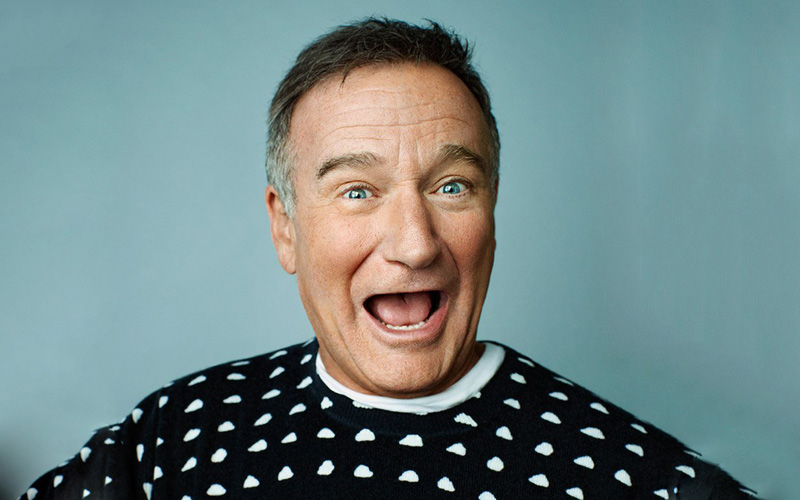
![[source]](http://deadshirt.net/wp-content/uploads/2014/08/800_worlds_greatest_dad_blu-ray14-300x166.jpg)
